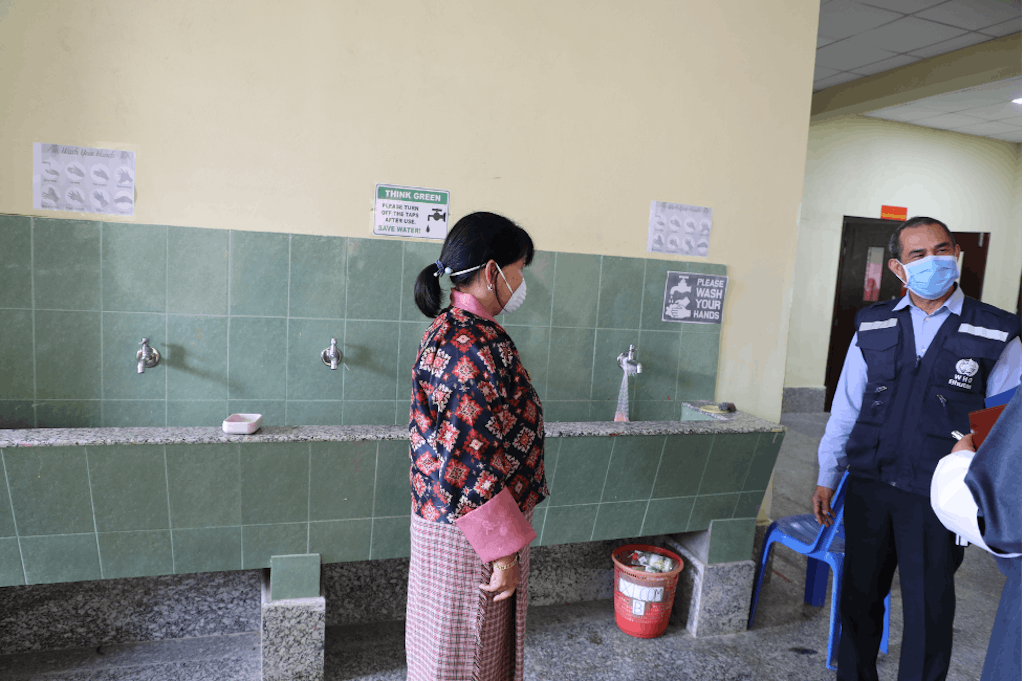A mere month before the first case of COVID-19 was reported in Wuhan, China, the tiny Asian kingdom of Bhutan (population 775,000) was already working with the World Health Organization (WHO) to simulate what a national response to a global pandemic could potentially look like.
Participants from all sectors — including armed forces, police, civil aviation, customs and food safety authorities, flight crews, health officials, and a national service volunteer group called Desuung — brainstormed and acted out what their role would be in the scenario of a passenger arriving from abroad with a suspected case of a hypothetical coronavirus disease. The exercise allowed participants to pinpoint existing weaknesses and areas of improvement in case of a real pandemic.
According to WHO and Bhutan officials, this early simulation largely contributed to the country’s success in fighting the COVID-19 pandemic — with zero deaths, zero infections among health workers, fewer than 500 total cases, and a high patient recovery — despite being nestled between China, where the virus originated, and India, which has one of the highest number of cases in the world.
With WHO’s support, Bhutan acted early to implement core public health measures to detect, test, trace, isolate, and treat cases. The country also worked to scale up the capacity of health care workers, hospitals, laboratories, and ensuring that the delivery of essential health services would not be affected even during a lockdown.
Years of emergency preparation
Dr. Rui Paulo de Jesus, the WHO representative to Bhutan, traces the country’s successful COVID-19 efforts all the way back to 2018 when Bhutan underwent a joint external evaluation of its emergency readiness. He explained that emergency preparedness and response is one of the eight flagship programs in the WHO South-East Asia Region, and its importance is emphasized in every work plan.
“Even before the COVID-19 outbreak emerged, WHO invested a significant amount of funds to enhance preparedness for both natural disasters and disease outbreaks,” he said.
WHO worked closely with the Bhutan government to set up a health emergency operations center as well as a WHO Emergency Operations Center. WHO also invested in equipment such as Medical Camp Kit tents, which can be deployed within hours if there is service disruption in health care facilities. One of the ways the tents have been used, for example, is as flu clinics to treat patients with respiratory disease symptoms to prevent them from mixing with other patients and spreading infectious diseases such as COVID-19. The clinics also serve as screening sites for COVID-19.
The Bhutan Ministry of Health also worked with WHO to strengthen laboratory capacities, including upgrading the Royal Centre for Disease Control by providing equipment and training staff. The work continues to this day and has been a critical part of Bhutan’s COVID-19 preparedness and response.
Ready for the pandemic
As the COVID-19 pandemic started to overtake the world, training front-line workers became increasingly important. Using protocols provided by WHO, Bhutan assigned and trained workers to lead the front-line response. De Jesus explained how even before the first COVID-19 case was reported in the country, health care workers underwent weekly training on how to properly put on and take off personal protective equipment (PPE), “so it would become second nature.” WHO supported the team by delivering PPE and providing funding support.
The organization is part of the country’s Technical Advisory Group for the COVID-19 response, which provides a daily analysis of the epidemiological situation. In the initial days of the outbreak, the WHO country office played a key role in updating and sharing the latest technical guidelines and strategies to design a timely national response with the Ministry of Health.

This prep work and training ensured that when the first case was identified in Bhutan in March, the team was ready to move very quickly. The COVID-positive lab results came at midnight, and by 6 a.m., all the relevant contacts were identified, isolated, and placed in quarantine.
“No country in the world can be 100% prepared for a public health threat,” says de Jesus. But if there is anything to learn from Bhutan, it is that preparedness is the first step toward winning the battle against COVID-19 and future pandemic threats.
“It is now evident to all of us that it is worth it to invest in emergency preparedness in all aspects. As WHO, we need to continuously review our readiness because the COVID-19 pandemic is not the last one,” de Jesus said.
This article originally appeared on the World Health Organization’s webpage and has been edited and republished with permission.
CONSIDER A DONATION TODAY
Every donation makes a difference. Support WHO’s lifesaving efforts to respond to the COVID-19 pandemic by giving to the COVID-19 Solidarity Response Fund.
You can learn more about WHO’s lifesaving work around the world here, and find details of how funds are used to support COVID-19 efforts here.
Featured Photo: WHO Bhutan



 View All Blog Posts
View All Blog Posts

